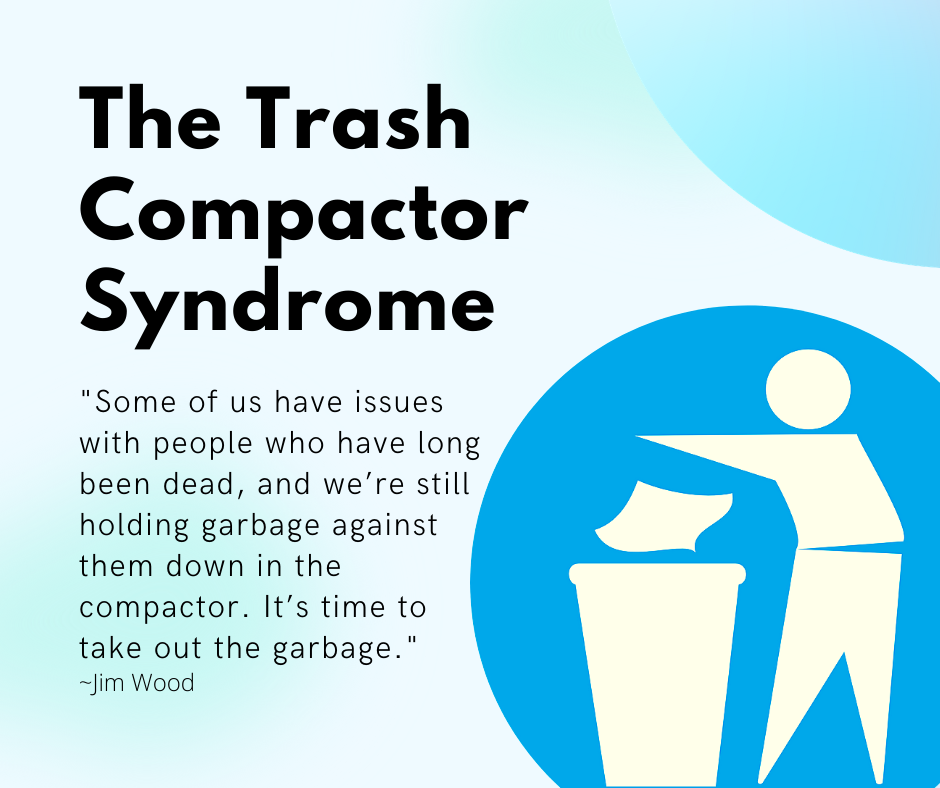Forgiveness and Trust, part 2
Love is patient, love is kind. Love does not envy, is not boastful, is not arrogant, is not rude, is not self-seeking, is not irritable, and does not keep a record of wrongs. Love finds no joy in unrighteousness but rejoices in the truth. It bears all things, believes all things, hopes all things, endures all things.
1 Corinthians 13:4-7
In 1 Corinthians 13:5, we read, “Love keeps no record of wrongs suffered.” As I counsel people, I often encounter what I call the trash compactor syndrome. The reason why many people have such difficulty controlling their expressions of anger is that when they are hurt, rather than resolving the issue, they just push their feelings down inside. It’s sort of like putting trash in a trash compactor. It’s continually stored and compressed, so that more and more can be added. When something upsets us, we don’t want to be upset. “I don’t have time to deal with this right now,” and so I just shove it into the trash compactor.
There are things left over from childhood, that are already deep down inside the trash compactor. Childhood incidents are compacted very tightly – painful memories, bitter and unforgiven, and the trash was never emptied.
Perhaps you grew up in a family where it wasn’t safe to express anger. Expressing anger just wasn’t allowed. Or, perhaps you grew up around other people who were so busy displaying their anger, you didn’t learn how to get rid of yours. Many people have never been allowed or shown how to empty the trash compactor. If you do not empty the trash compactor, eventually you will have a malfunction, which in the case of relationships can take the form of an explosion. There’s no room left and the trash bursts forth.
It works like this: Fred has had it up to his eyeballs in stress and pressure, but he has not exploded. He’s still keeping the lid on his emotions. He thinks, “I can handle it.” He couldn’t blow up at work, because it might cost him his job. So, he stuffed it. He couldn’t run over the slow moving car in front of him on his way home. So, he stuffed it.
When he walks into the safety and security of his home, and his wife immediately tries to unload her stress and frustrations on him, it’s as if she is taking a piece of trash and waving it in his face, and there is no more room in the trash compactor. So, he explodes at her. His wife doesn’t understand the power of his anger over the minor problems she brought up. So now, she yells at him for yelling at her. This ugly scene is repeated in millions of homes every day.
What happened? She did nothing to justify his explosion, but he had no way to deal with her trash, because he already had all the garbage he could deal with himself. We’ve all been there at some time. Instead of saying, “Honey I think you’ve got some other things bothering you,” she says, “You are totally irrational.”
If he has time to think and reason, he’ll realize that his response was out of line, so he’ll pick up a few pieces of the trash he’s scattered around and say, “I’m sorry, I shouldn’t have blown up like that.” But, still not emptying the trash, he’ll go off still full of garbage, waiting for the next opportunity to explode, perhaps at his child who doesn’t know the word irrational yet.
When I forgive, I don’t simply take the garbage and put it down inside, out of sight out of mind, I, instead, open up and deal with the pain, “This thing that has happened to me. It was wrong. I am hurt, but God has forgiven me for all the things I’ve done to hurt others, and I’m going to forgive this person for what they’ve done to me. While I’m at it, there’s a lot of other garbage I will empty out and deal with, too.” We need to deal with the wrongs from six years ago, twenty years ago, or whatever is still eating us up.
Some of us have issues with people who have long been dead, and we’re still holding garbage against them down in the compactor. It’s time to take out the garbage. We must get clean on the inside by being honest with God about the things that are in there that God says we must forgive – the bitterness, the hurt, the rejection, the pain, the anger – we must allow God to clean us out. This process can take time, and it may involve (and usually does) other people who can help us work through the pain. But, whether we seek professional help or find godly counsel elsewhere, the road to healing always involves forgiveness.
To truly forgive others, I must learn to accept forgiveness. I must receive God’s forgiveness, and I must learn to accept forgiveness from other people as well. The failure to accept the grace of forgiveness will leave us a prisoner to guilt and fear. When we know we are forgiven, we learn to forgive others.
If I don’t learn to receive and offer forgiveness, I will always be holding things against other people as a means of self-defense.
If I have not learned to accept forgiveness, I’ll be forever trying to justify myself by saying, “Do you know what that person did to me?” In other words, “keeping a record of wrongs suffered.”
We are commanded to forgive. We must forgive, or we will not be forgiven. Jesus provided forgiveness for us. But, we must also be willing to forgive others, whether they tell us they’re sorry or not.
Forgiveness is not a matter of convincing myself that nothing wrong has occurred. “What she did used to bother me, then, I realized, it’s not so bad. I just try to remember her good qualities and let them balance her faults.” Many people do this, but rationalizing is not forgiving. When we talk this way, we are still trying to hold the other person’s life in the scales of judgment, and what if we conclude that the other person’s evil eventually outweighs the good? To forgive is to say that even when another person has done something hideously evil, God is the Judge. My debt was paid at the cross. I will no longer hold this to your account. I will pray for God’s mercy in your life.
Featured Resource:
To receive email updates when new blogs are posted, enter your email address here.



